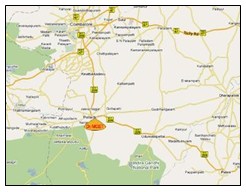| Name of the Institution |
Arulmigu Meenakshi Amman College of Engineering |
| Address of the Institution |
Vadamavandhal, Near Kanchipuram, Thiruvannamalai - 604 410 |
| Longitude and Latitude |
79.7 & 12.7  |
| City & Pin Code |
Thiruvannamalai - 604 410 |
| State / UT |
Tamil Nadu |
| Phone number with STD code |
+91-0418247226 |
| FAX number with STD code |
+91-0418247515 |
| Email |
amacengg@yahoo.com |
| Website |
http://amace.edu.in |
| Nearest Railway Station(Dist in km) |
Kanchipuram, 15 KM |
| Near Bus Stand |
Vembakkam, 1 KM |
| Nearest Airport(Dist in km) |
Meenambakkam International Airport Chennai, 72 KM |
| Type of Institution |
Private-Self Financed/Unaided |
| Category (1) of the Institution |
Minority (Telugu) |
| Category (2) of the Institution |
Co-Education |



